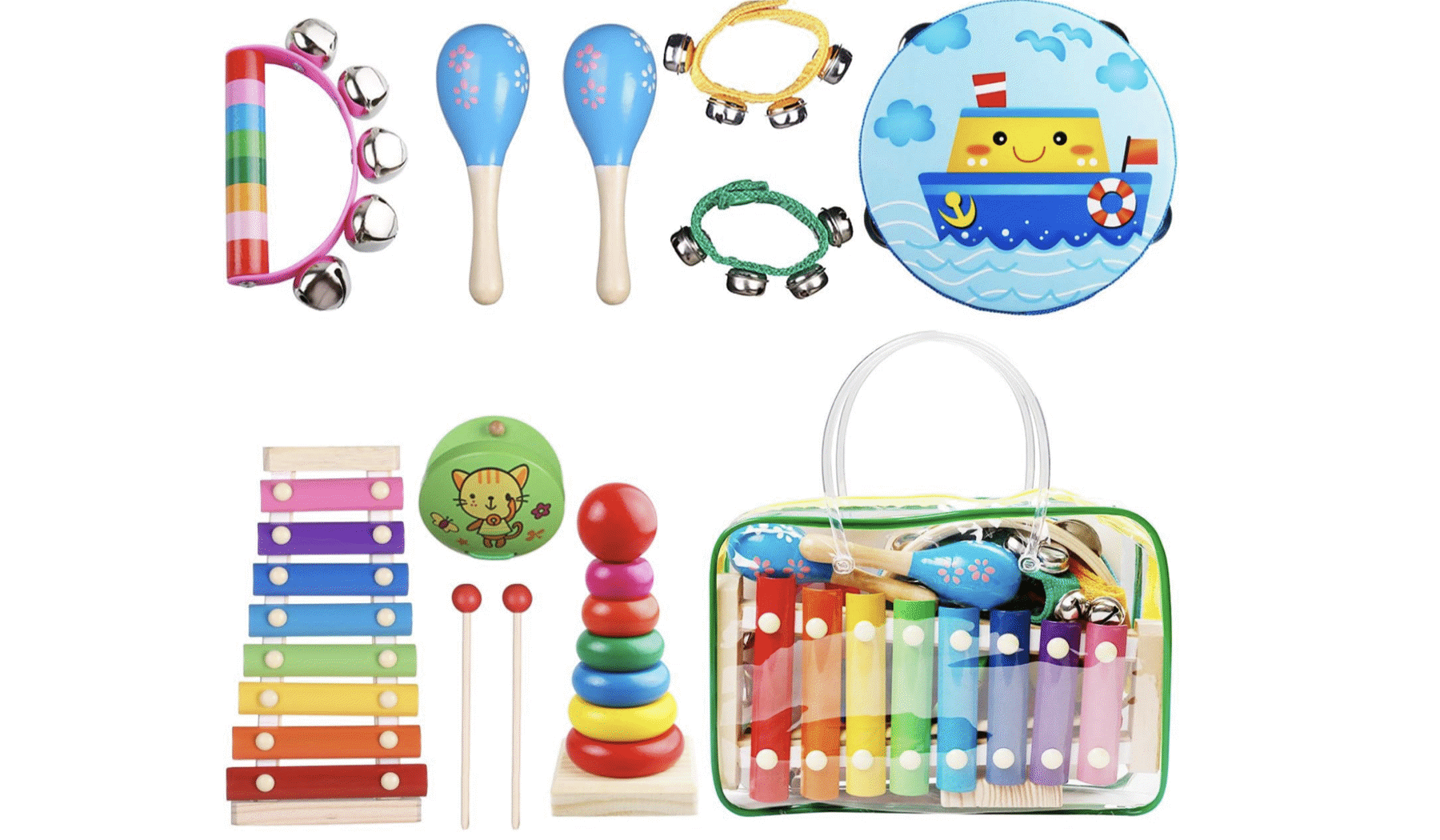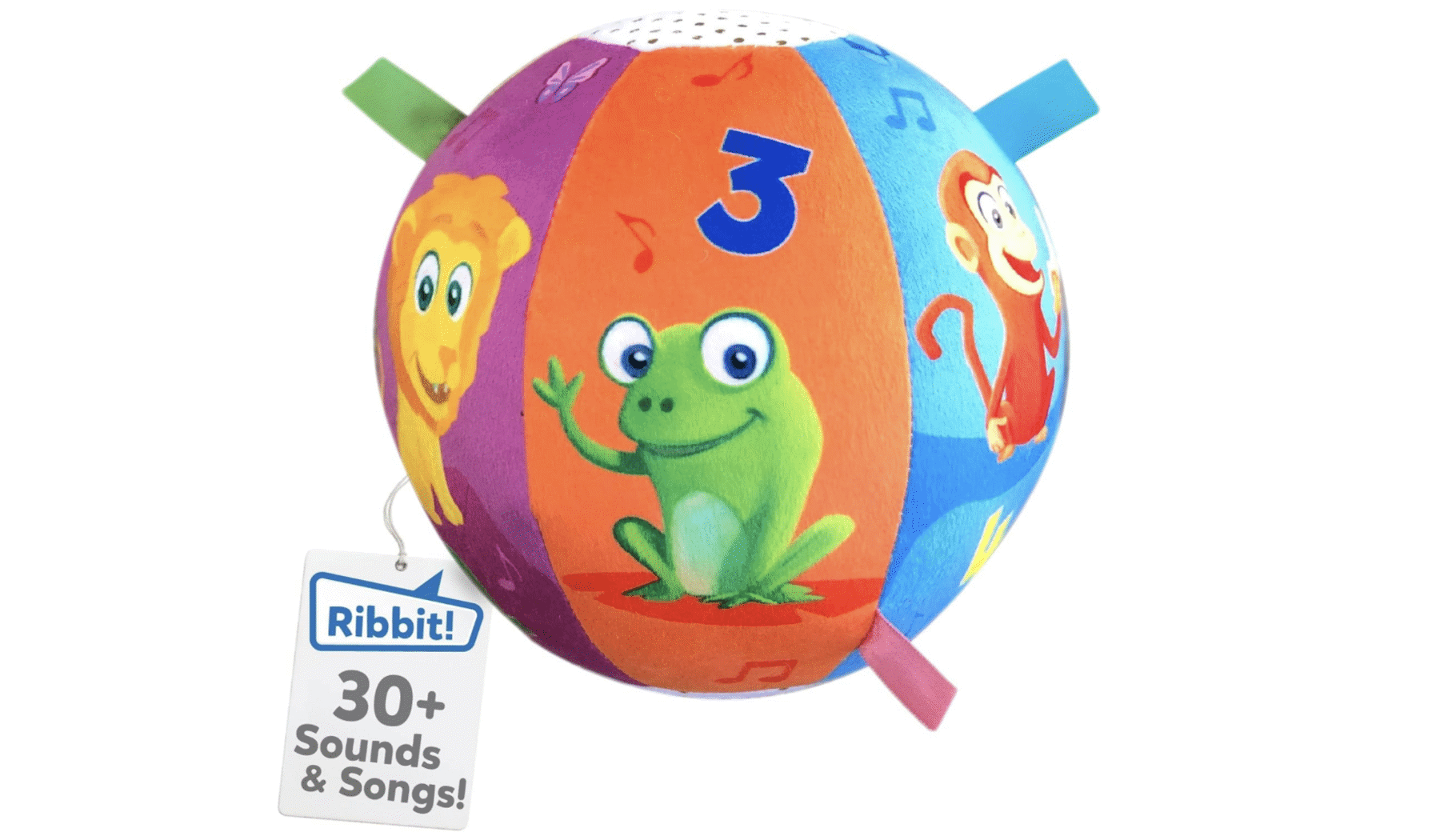10-Month-Old
This month, your little one should be able to stand on their own for a short period of time, and they should begin experimenting with moving around on his feet. You should be hearing simple words like “Mama” and “Dada” from your baby now, with more to come in the upcoming weeks.
Thanks to their new pincer grasp, your baby will be better at holding things and will hopefully be working on drinking from a sippy cup, which you can give to them at each meal. Pay attention to the gestures your little one makes these days; they will often be used as their way of communicating with you when they cannot say the full word for what they want or see.
Teething is still an ongoing process at this stage of your little one's development and can have negative effects on their sleep habits. The top four teeth under your baby’s gums will begin coming in and causing severe discomfort. This unavoidable pain can be enough to keep your little one up at night and, at times, even wake them up from their slumber.
As a result of disrupted sleep from teething, your little one might display signs of grumpiness and exhaustion throughout the day. You can expect your baby to be more clingy to you than normal since they are in pain and sleep-deprived, too. This is when your little one's eating progress may regress since eating solids might cause them pain during this time.
It's okay, and once their teeth come in and the pain is relieved, they will once again find interest in solid food options. It is common for mothers to be the only ones a baby will let soothe them back to sleep at this stage, so stay patient and try rocking your little one if they wake up throughout the night. Your sleep will likely be lacking, too, so take care of your health as best as you can throughout this phase.
On average, a ten-month-old baby girl typically weighs around 18.7 pounds, while boys are a little heavier at about 20.2 pounds. In terms of length, girls measure approximately 28.1 inches, and baby boys are slightly taller at approximately 28.9 inches.
It's important to note that these numbers are averages, and every child is unique. Some babies might be a little smaller or larger than these statistics, and that's perfectly normal. Remember that these measurements are just one way to track your baby's growth and health.
While it might seem like you can't keep up with how fast your little one is growing (and growing out of clothes!), their growth rate will slow down a bit when your baby reaches ten months old. They've been on a journey of rapid development since birth, but now things are steadying out. On average, your baby will grow about half an inch each month and gain around half to one pound monthly. This slower growth rate is all part of the natural progression as they move into toddlerhood.
Your little one is becoming much more mobile and active, meaning those adorable baby rolls might disappear as they become lean and toned. Don't worry if you start to see a decrease in baby fat; it's a sign that they're becoming stronger and more agile. Although, I'm sure you don't need us to tell you about them getting faster and stronger!
Many mothers experience stretch marks throughout and after pregnancy, but do they ever go away? Pregnancy stretch marks are inevitable and occur in almost every pregnancy, but they will often lighten over time. For the most part, stretch marks are permanent, but certain creams can help to lighten them. If you are breastfeeding, it is vital to check with your doctor that the cream you are using is safe to breastfeed with.
Although you might not be thrilled to accept your new skin, your stretch marks are a reminder of the beautiful baby you nurtured and brought into your life. If you are really upset by your stretch marks, talking to a dermatologist can be beneficial. Otherwise, creams containing collagen-building retinoids can help heal your skin.
The bottom line is that most women who experience pregnancy also experience stretch marks. You are not alone and have no reason to feel shame regarding your skin after pregnancy. After all, your little one is worth the stretch marks.
If your baby has begun experimenting with walking and forms of movement other than crawling, some fun activities to participate in this week consist of encouraging those movements from them! Your ten-month-old has likely discovered that they can shuffle around when leaning on a piece of furniture for support, but now it is time for them to start learning to walk independently.
As they begin learning to walk, you can motivate their movements by placing their favorite toys around the room and encouraging them to get them. Place these in different locations that require them to stand up or bend down. You can even try having them get to you from a few feet away if they are an absolute beginner. When doing this activity, you can demonstrate pushing the toys and other objects across the floor in the hopes they mimic your movements. This will help familiarize your baby with balance.
If your baby’s teething hasn’t turned them away from solid foods, continue to introduce new fruits and vegetables to them each day. A tip for this stage is to begin to serve your little one the same thing you are serving the rest of the family. Cut any finger foods into small pieces and only offer them things that are safe for a baby and won't pose choking hazards.
Instead of giving your little one nuts or seeds that they might choke on, start with nuts or seed butter that you can serve on a spoon or spread thinly on top of something.
If your little one is hesitant to try new things, some tips that may help include trying each item several times, serving small portions, trying different methods of cooking the food, and more. If your little one makes a mess, that is okay; at least they are trying new things! Remember to stay patient and persistent; your baby might not realize they enjoy something until they have tried it multiple times.
As your little one's social skills continue to shine, they will better communicate their wants and needs with you. With stronger social skills comes greater confidence in your little one, and they will continue enjoying exploring the world around them. As they mature, you will notice a change in your baby's emotions. They will gain a more vital ability to control their feelings rather than becoming overly frustrated when things do not go their way. Your little one is approaching a year of life, so you can continue to expect to see these social and psychological changes.
As you know, your little one's social skills are advancing rapidly these days. You can continue to expect your baby to enjoy copying your movements and trying to mimic the sounds you make. Not only will your baby find joy in copying you, but they will love it when you and others imitate their actions, such as any claps or facial expressions they make.
These activities will get your baby giggling and help their social development. They will also help their language skills and communication!
You will notice your baby begin to use different forms of communication as they mature. This week, babies enjoy communicating even if they are not the best at it. Your little one's verbal communication skills might not be fully capable of conversing just yet, but if you have been using simple sign language signs, your baby should be able to use those by now.
Introducing simple signs to help your baby communicate things that they cannot verbally communicate will make things easier and less chaotic around the house. At feeding time, you can teach your little one signs for “more” and “all done” so that they can let you know if they are still hungry after eating or if they are not hungry enough to finish their plate. It will amaze you how fast your child will catch on to these signs and be able to use them to their benefit.
When you notice your baby attempting to name something, even if they don't quite get the pronunciation right, be sure to offer plenty of encouragement. Let them know they're on the right track, and repeat the word for them a few times, pointing at it. This positive reinforcement helps boost their confidence and builds a stronger connection between the words they hear and the objects or concepts they represent.
To promote a healthy nighttime sleep routine, maintain a consistent bedtime schedule. A warm bath, soothing songs, and a relaxing bedtime story can create a calming environment that signals to your baby that it's time to rest. Keep the room dimly lit and ensure the room temperature is comfortable. If your little one is struggling with distractions at night, try investing in a white sound machine to filter out the noises in your baby’s room.
Your little one will require anywhere between 12-16 hours of sleep each day, between their naps and night sleep. The hours will likely be broken up into around 11-12 hours at night and two daily naps that add up to about 3-4 hours of daytime sleep.
At ten months, most babies will be awake for a shorter amount of time in the mornings and take their first nap after just a few hours of being awake. This will mean that your little one will be awake for most of the afternoon. If your little one is waking up throughout the night, now is a good point in their life to let them try soothing themself back to sleep.
Unless something is wrong and they need you to feed them or hold them, your baby should be able to get back to sleep and be in the habit of doing so at this age. While it doesn't work for everyone, some families benefit from sleep training. Give it a try if your baby's sleep is regressing and you have not attempted it yet!
It is common for parents to deal with a feeling referred to as “parent guilt," which is not a great feeling. The feeling of “parent guilt” refers to the thoughts that overwhelm you as you second guess yourself and the choices you make for your little one.
Second-guessing your parenting can come from anything, from feelings of wishing you did something differently to feeling like a bad parent for taking care of yourself or returning to work, and any other worries that parents often experience.
If this sounds like you, you are not alone, and plenty of parents have experienced the feelings that you have, too. Balancing parenting and all other aspects of your life can be challenging and exhausting, but it is important not to pull yourself into a spiral of guilt. Try your best not to let the little things get to you. It can be hard, but if it won't matter in the future, there is no sense in tearing yourself down about it now.
Taking a break from social media can also help the feelings of parental guilt by stopping you from comparing yourself to others. Social media is not real, so do not feel ashamed of the unrealistic expectations it has set for parents all over. You are not the only one struggling with feelings of guilt; you just do not see the behind-the-scenes of other families' reality.
People only post what they are proud of online; they do not share when things go wrong or messes are made, so try to remember that what you see online is only part of what people are really going through.
Now that your little one is gaining a better understanding of language, certain words may be easier for them to understand and mimic than others. At this age, your little one might understand the word “no” in certain situations but will not have a full understanding of what it means.
Babies understand tone of voice more than words themself at this stage, so when your little one is about to do something dangerous or questionable, and you want to stop them, using a stern tone will get their attention faster than just saying the word “no.”
Since they are too young to discipline, try redirecting your little one’s focus when you find them doing something they aren’t supposed to be doing. Steer them away from any dangerous objects or things they are not allowed to touch consistently, and they will soon learn what they are allowed to play with and what is off-limits. Setting boundaries is a process, but it will ultimately keep your child safe as they continue to flourish and develop over time.
Soon enough, your little one will be walking around the house without assistance. Thanks to muscle strength, coordination, and balance development, you will soon experience your baby’s first independent steps if you have not yet. The more comfortable your little one gets with this newfound skill, the more independent they will become. You can expect your child to try getting your attention when they walk or do something new and get excited by your applause and support! If your baby is nowhere near this walking milestone, do not worry. Most babies will begin walking between 10 and 18 months of age. All babies are different and will reach this milestone when they are ready.
Seeing your baby learn to walk and take their first steps completely on their own can be emotional. As thrilled as you are to see your little one developing and reaching milestones, feelings of fear, worry, and sadness are completely normal. Once your child can walk, you might overwhelm yourself with worries and anxieties about them falling, walking into something, or getting hurt.
Learning to walk independently is a huge milestone that leads your baby to their toddler years, which can be bittersweet. Once your little one masters this skill, it might benefit you to re-babyproof your house since they will be looking at things from a different perspective, height, and angle now.
Now that your little one is experimenting with walking, you may assume they need shoes. While shoes are definitely a good idea for wearing when you leave the house or play outside, it’s not necessary for your child to have them on all the time. Ideally, you want to keep your little one's feet protected outside or on dirty floors, but walking barefoot is great for their development!
In order to help your baby's foot muscles, bones, arches, and ankles continue to develop and get stronger, letting them experiment with walking barefoot is crucial! If you are looking for shoes to buy for scenarios where they are necessary, stick to velcro or slip-ons to make your life easier. Your future self will thank you. Even if the lace-ups are more stylish, are they really worth the hassle? Most moms say they aren't.
Now that you’ve been a parent for ten months, hopefully, your nerves have calmed down. While you used to panic anytime your little one showed a slight sign of getting sick, you are more aware of what to expect now. Knowing when to call a doctor or when to ride things out at home is vital since your baby will encounter a variety of common viruses and illnesses as they get older. From colds to fevers, we don’t always know what is worthy of a doctor’s visit.
To learn when to contact your doctor versus when it is unnecessary, you should be familiar with taking your little one’s temperature. Knowing your baby’s temperature can help identify the severity of their illness. You can ask your doctor to demonstrate how to use a thermometer on your baby if you are unsure, but taking your little one’s temperature is something you can do at home instead of going to the doctor to find out.
Always check with your baby’s doctor before giving them a new medication for the first time. If your baby has already had the medication, and you know they respond well to it, always refer to a dosage chart to ensure you administer the correct dosage for your baby’s weight.
Now that your baby's first teeth have started to emerge and they are eating a more comprehensive range of foods, it's also crucial to maintain a dental care routine. Begin by gently brushing their teeth twice daily with a soft toothbrush and a small amount of baby-specific toothpaste.
Brushing in small, circular motions helps thoroughly clean each tiny tooth. Make this a fun game or sing a song to make it a more enjoyable experience for your little one, especially if they are not too keen on tooth brushing. It isn’t always fun, but remember that early dental care sets the foundation for a lifetime of healthy teeth and gums for your little one.
Connecting with other moms right now can help you as much as anything. As your little one begins to master the skill of walking, you will likely find it more difficult to keep everything orderly and in control. Throughout this hectic stage, feelings of guilt and being overwhelmed are common.
Keeping your little one entertained can be a draining experience, so forming a group of moms who understand what you are going through is a wonderful idea. Connecting with other moms in the area will be great for you while also providing play time with another child for your little one. You will be amazed at how different you feel once you find a village of moms you trust and are comfortable with who can provide advice for one another.
At times, a mama friend might even save you in a pinch when you need someone to supervise your baby. Get out and meet some other moms like you through playgroups, Facebook groups, and anything in between!
Parent and baby classes are fantastic places to meet other moms. Now that your little one is a bit older, it’s a great time to look out for new classes, such as baby yoga, music, or swimming. Not only will your little one benefit from the activities, but you'll also have the chance to chat with the other parents during the sessions! These classes often create a supportive and friendly atmosphere where you can relate to other parents and make new friends for both you and your little one.
Story and rhyme classes- These book readings and story-telling classes can be great to keep your little one engaged. You can also pick up lots of story-telling skills from the professionals who work there to keep them engaged in reading time at home!
Baby music sensory classes- Baby music and sensory classes are so much fun for your baby, especially once they’re on the move and can properly explore the room! There’s often plenty of different music with different lights, instruments, and sensory-stimulating activities to occupy your little one’s mind.
Baby swimming classes- Baby swimming can be great for babies of all ages. But, it’s not uncommon for parents to try out swimming classes while their little one is under six months old and assume they don’t enjoy the classes. If this is the case, now might be a good time to try baby swimming again. Many babies enjoy swimming much more once they can hold their heads up and kick around in the water.
Baby massage classes- Baby massage is amazing for babies of all ages and can be a nice thing to do with your little one. The gentle and calming baby massage class can offer great quality time for you and your baby to bond and have some quiet time together.
Baby play classes- Many indoor play areas hold regular midweek playgroups specifically designed for parents and young children to come and meet others. These are informal gatherings where parents come together to socialize while their babies have lots of fun and play together! Look online and on social media to see if any playgroup sessions are being held near you.
This week, you may introduce activities to your little one that will help their motor skills develop. These activities include drawing, painting, using chalk, and coloring.
A fun activity for you and your baby is drawing. While it might not be a full picture, offer your little one a large crayon and a big blank sheet of paper. Watch as they become excited by the different colors they put on the paper. It will likely be dots or short lines as opposed to full scribbles, but seeing the colors on the paper can be quite a thrill for your 10-month-old.
This activity will familiarize your baby with writing tools and help with holding eating utensils, too. Make sure that all of the drawing materials you provide are non–toxic in case your little one decides to chew on them. Some brands use ingredients such as honey to make their crayons baby-safe!
Wow, your little one is just over a month away from their first birthday! This past year has brought you various challenges and experiences you may have never encountered. The more entertainment you can provide for your baby at this time, the better. Keeping your little one occupied will make your life easier and keep their brain stimulated! You can expect your little shadow to be copying you in any way they can, whether that be your actions or emotions, so keep that in mind.
As your little one becomes more comfortable in social settings, they might start to experiment with new skills and forms of interaction. If you find your baby doing something they shouldn’t be doing, redirect her with a stern tone of voice. Since they are still learning how to understand and communicate with words, they will understand your tone more than the words you are saying.
You can tell them “no,” so they start getting an understanding of what is on or off limits for them, but the best way to navigate this stage is redirecting your little one’s attention to something else when you want them to stop what they are doing. Setting boundaries is a great way for your child to learn.
Setting limits for your baby is a part of the developmental process. As they learn and are able to comprehend more, you will be able to implement rules and limits for your growing child. Even if they don’t always show it, they do likely understand the word “no” by now, especially when you use it with a strong tone of voice.
With minimal impulse control, even if they hear you, your little one might continue doing what they are being told not to do. It is important to remain consistent with the limits you set for your child since it will likely take several times for them to learn and remember the rules. Instead of scolding your baby, it is more beneficial to sternly explain to them why they cannot do what they are being told to stop doing and redirect their attention to something else.
Setting up a babyproof play area can help avoid this situation altogether; however, implementing these boundaries is essential since they will need to be followed eventually.
While your little one’s car seat may be safe for use until they reach 35 pounds, they will likely outgrow it lengthwise prior to reaching the maximum weight. Many babies outgrow their first car seat by month eight or nine and get too tall for them.
While your infant car seat is easy to maneuver, transport, and take your baby in and out of, it might be time to switch to a convertible car seat if you haven’t already. Convertible car seats can be installed rear or front-facing, depending on your child's age, height, and weight.
The American Academy of Pediatrics recommends keeping your little one rear-facing for as long as safely possible, which for many car seats is up to 40-50 pounds regardless of their age. When a child rides rear-facing in the car, the hard shell of the car seat supports their head, neck, and spine, keeping their body protected in case of an accident. Once your little one switches to a front-facing car seat, their head is not as protected or supported in a crash.
If you find that your baby is struggling with sleep despite a consistent routine, consider the possibility that they might be distracted by their surroundings. Most little ones will benefit from moving into their own room soon if they haven’t done so already. This change can help eliminate distractions and create a more consistent sleep environment.
If you haven’t transitioned your baby into their own room yet, you might feel nervous to do so. If this is the case, try to gradually move your little one into their own room over the course of a week, and by the end, you should feel much better about the idea of it. Being apart from your baby all night can be scary, but having an independent sleep environment can also be the best thing for them.
Before making the transition, ensure the new room is baby-proofed and set up with a comfortable crib, familiar blankets, and black-out blinds.
Knowing and being mindful of your limits is vital this week. As far along in your pregnancy recovery as you are, you are likely still building your muscle and stamina back. You might not be able to push yourself as hard as you used to yet, and that is okay. It is possible that you are on your way there or that this is your new reality.
It is important to listen to your body when something feels off and understand that it is likely telling you to take it easy. For example, if you have a constant headache that you can’t seem to shake, it may be your body’s way of telling you to take a break. Stress can cause headaches, and this is typically a sign new moms get from their body, and they can last for days to weeks. Shaky legs are a sign you need rest as well. If you find yourself constantly tapping your legs, jittering, or shaking, it can be a sign that your body is unable to relax.
Overwhelming thoughts and feelings are also completely normal at this stage. These thoughts sometimes go as far as disrupting your sleep and leading to insomnia. If you are unable to shut off your brain and get rest at night, it could be your body telling you to take a break and take a breather. There is nothing wrong with taking a little time for yourself to make sure you are healthy enough to provide for your baby, too!
While many people associate postpartum depression and other postpartum mental health concerns with the immediate aftermath of childbirth, this isn’t always the case. Symptoms can manifest at any point after giving birth, and many parents don’t actually spot that they might be suffering for up to a year after giving birth.
While it’s normal to experience some changes in your mood, it’s important to keep an eye out for the symptoms of maternal mental health issues. No list of symptoms can be exhaustive, and everyone can experience mental health struggles in different ways.
If you're experiencing any of the symptoms of common postnatal mental health problems or simply feel that something isn’t quite right, reaching out for support is essential. In the US, resources are available to help parents with postpartum mental health concerns. The first step is to reach out to your healthcare provider. They can assess your symptoms, provide guidance, and refer you to appropriate mental health services.
While you have likely experimented with stacking blocks and toys with your little one, they may enjoy arranging them in other ways, too! Providing your baby with a variety of toys and objects will stimulate their mind and allow them to arrange them in any way they desire. You can store these objects in an easy-to-open box so that your baby can open it with practice.
Show your little one how to open the box and let them try it. Once they can see what is inside the box, let them remove the objects or help them do so. Watch as they decide what to do with these toys. Your baby may stack the objects, scatter them around, line them up, or throw them.
Incorporate toys and pieces that are brightly colored and have a variety of textures. This activity will help your child coordinate movement between objects and encourage them to focus.
As your little one gets older and becomes more sociable, trying out daycares might be beneficial for you, them, and your family as a whole! Daycare is a great way to ensure your child is stimulated, entertained, learning, and practicing social skills while you work or run errands.
Whether you are just beginning to take advantage of signing your child up for daycare or you have been taking them for months already, keeping clean and germ-free is essential yet quite a challenge! Whenever a group of children spends time together in a confined space, it becomes a breeding ground for germs and bacteria. While exposure to certain bacteria and viruses can help strengthen your baby’s immune system, you definitely won't want them to come home with a new illness every week.
As always, make sure your little one is getting enough sleep and eating enough nutrients. Packing fruits and veggies for them to snack on at daycare is a great choice, but make sure you pack a utensil or have their supervisors wash their hands before snack time.
Immediately wash your little one’s hands when they come home from daycare each day and sanitize any toys that they bring to and from with them. Always follow the requests of your daycare provider and keep your little ones home if they show any signs of illness to prevent them from spreading it. Your baby’s pediatrician can advise you on vitamins that can help boost their immune system, as well as administer vaccines to ensure they are up-to-date and protected.
The information on the Your Baby Club website is not intended to be a substitute for professional medical advice, diagnosis or treatment. Always discuss any health concerns with a qualified healthcare provider and carefully review all guidance that comes with any medications or supplements before taking.










